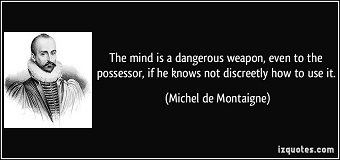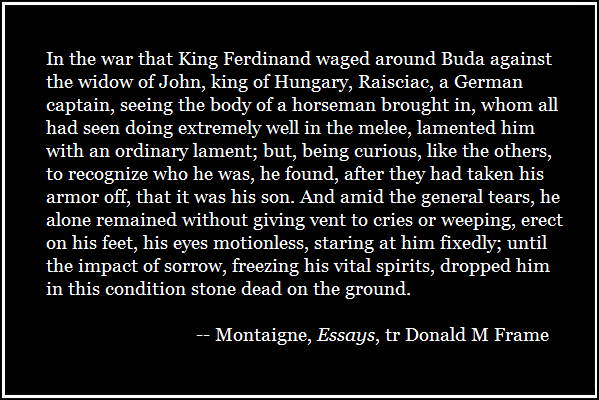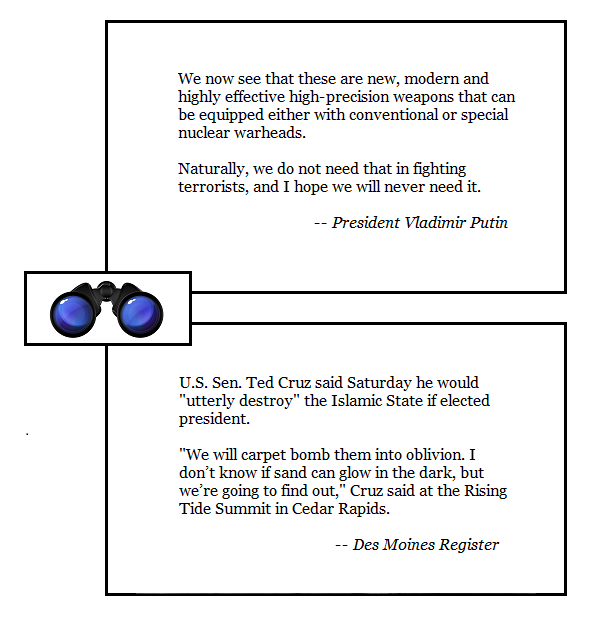Aman, or reciprocal safety under Islamic law
Monday, December 21st, 2015[ by Charles Cameron — what eye do you use when there’s more going on than meets the eye? ]
.
Twice in one day, a week or so ago, I had reason to look up the meaning of “aman” in Islamic law. My source here was M. Reichberg and Henrik Syse, eds., Religion, War, and Ethics: A Sourcebook of Textual Traditions, p. 307, under the heading Aman (Pledge of Safety):
Aman is a temporary pact of security whereby visitors from an enemy territory were conferred a certain level of protection from hostile acts (on life, liberty, and property) during their stay in the opposing community. Classical jurists agreed such a pact could be granted by Muslims to non-Muslims, and vice versa. Concerning protection given to non-Muslims, the overwhelming majority of jurists agreed that an adult free man may grant aman to a non-Muslim and that such an aman was to be respected by the entire Muslim community. Once granted aman, these non-Muslims were guaranteed protection for the duration of their visit on Muslim territory, and if an imam wished to retract the aman, he was obliged to guarantee protection until the non-Muslim had been escorted away.
Jurists also examined the obligations of Muslims who had been granted aman in a non-Muslim territory. Most agreed that if a Muslim entered enemy territory on the basis of an aman contract granted by non-Muslims, guaranteeing his life and property, this agreement should be mutually respected, such that for the duration of his stay the Muslim would not be permitted to harm the non-Muslim enemies. For example, as later detailed, al-Shafi’i argued that Muslim men whose women and children had been taken captive were not allowed to free them by attacking their non-Muslim captors, if this would entail a violation of an aman agreement. It would be preferable, al-Shafi’i maintained, to ask for a retraction of the aman than to save the captives by its violation.
**
One of the items that sent me scurrying towards this text was a long and fascinating discussion of the Japanese (also German and Italian) internments during World War II, which Michael Lotus opened up on FaceBook. I’m not sure whether this FB convo will be accessible to everyone, but if it is, you will find it here.
The other occasion was a paragraph that caught my eye in Jenny Taylor‘s blog post You cannot fight religion with atheism. I’ll give you the full paragraph for a bit of context, but it’s the remark about the secret covenant that I’m interested in here. Jenny ts discussing the British response to IS and how it will be perceived from different angles:
And I’m not sure I see it the Church’s way either. That’s because none of it has a proper mandate from the people; the people who will inevitably suffer on the streets of London and other cities once the secret ‘covenant’ Britain’s MI6 have had with international Islamists is revoked by what will be seen as a declaration of war. [And if you don’t believe me about that, read Islamic State: The Digital Caliphate just out.]
Abdel Bari Atwan‘s book to which Jenny links is highly regarded by folks such as Peter Bergen, so I went looking for a mention of MI6 in its pages, and found:
Musab Al-Suri confirmed to me that a tacit covenant was in place between MI6 and the extremists…
— after which, he talks about Saudi entities and indivisuals funding al-Qaeda. I was intrigued, and checked in Atwan’s earlier book, The Secret History of al-Qaeda, and read this equivalent but slightly longer passage:
I believe there was an unwritten truce between bin Laden and the Al Saud based on the understanding that so long as al Qaeda did not target the royal family or Saudi nationals, the regime would shut its eyes to the organization’s activities. The truce would have collapsed after 11 September 2001, when the US put enormous pressure on the ruling family to purge itself of terrorists and cut off sources of funding for their activities.
Atwan also quotes Abu Musab al-Suri in his Secret History:
London was the centre for communications between Islamist groups and groups opposed to the governments of their own countries. We maintained communications with jihadi leaders outside Britain, in particular Dr Ayman al-Zawahiri who used to call me regularly and I would take his calls in a telephone box in the London suburbs … John Major’s government was very clever and served the security of Britain and the interests of its people by accepting our truce by which we meant that we would never target Britain … as long as the security forces left us alone … When Tony Blair came to power in 1997 he tore up the unwritten understanding and stabbed the mujahedin in the back by changing the laws and harassing us.
Note that there is no specific mention of MI6 here, and the reference is to an “unwritten understanding”.
This is all hearsay, in fact — Atwan describing al-Suri’s thoughts rather than direct quotes from al-Suri — so I’m left wondering whether anyone actually offered the British a truce, or whether what’s really going on here is that al-Suri mentioned to Atwan that the British were taking advantage of aman protection against jihadists attacking a country (in this case, the UK) which had given them shelter.
Is this secret, tacit and unwritten truce really a truce at all, or just a mutual recognition of the existing limits of warfare under Islamic jurisprudence?
**
Consider in this context how Bin Laden himself chastizes Faisal Shahzad, the Times Square bomber, 9n this excerpt from Letters from Abbottabad: Bin Ladin Sidelined? p.41:
You have perhaps followed the media trial of brother Faisal Shahzad, may God release him, during which the brother was asked to explain his attack [against the United States] in view of having taken an oath [not to harm it] when he was awarded his American citizenship. He responded that he lied [when he took the oath]. It does not escape you [Shaykh `Atiyya] that [Shahzad’s lie] amounts to betrayal (ghadr) and does not fall under permissible lying to [evade] the enemy [during times of war]…please request from our Pakistani Taliban brothers to redress this matter…also draw their attention to the fact that brother Faisal Shahzad appeared in a photograph alongside Commander Mahsud. I would like to verify whether Mahsud knew that when a person acquires an American citizenship, this involves taking an oath, swearing not to harm America. If he is unaware of this matter, he should be informed of it. Unless this matter is addressed, its negative consequences are known to you. [We must therefore act swiftly] to remove the suspicion that jihadis violate their oath and engage in ghadr.
It’s interesting that Dr Fadl, aka Sayyed Imam Al-Sharif, the prominent Jihadist ideologue whom Lawrence Wright terms an “Al Qaeda mastermind” makes a very similar claim in his Refutations, in whichb he retracts his previous suppoort for AQ on grounds of religious law:
Fadl acknowledges that “terrorizing the enemy is a legitimate duty”; however, he points out, “legitimate terror” has many constraints. Al Qaeda’s terrorist attacks in America, London, and Madrid were wrong, because they were based on nationality, a form of indiscriminate slaughter forbidden by Islam. In his Al Hayat interview, Fadl labels 9/11 “a catastrophe for Muslims,” because Al Qaeda’s actions “caused the death of tens of thousands of Muslims—Arabs, Afghans, Pakistanis and others.”
The most original argument in the book and the interview is Fadl’s assertion that the hijackers of 9/11 “betrayed the enemy,” because they had been given U.S. visas, which are a contract of protection. “The followers of bin Laden entered the United States with his knowledge, and on his orders double-crossed its population, killing and destroying,” Fadl continues. “The Prophet—God’s prayer and peace be upon him—said, ‘On the Day of Judgment, every double-crosser will have a banner up his anus proportionate to his treachery.’”
As Hannah Stuart comments in Critiquing Radical Islamist Claims to Theological Authenticity on the respective views of Bin Laden, Dr Fadl and others:
While their interpretations differ, it is testament to the strength of the Islamic obligation to honour an oath that senior al-Qaeda figures view perceived transgressions with such severity.






